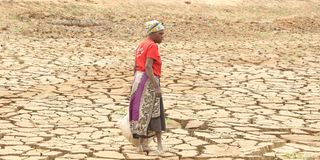Taita women, girls bear brunt of water crisis

A woman at the Kishenyi dam in Wundanyi, Taita Taveta County. Taita Taveta is reeling from the effects of changing weather patterns that have led to the drying up of two major dams that humans and livestock depend on.
What you need to know:
- The severe water scarcity in the area has disrupted lives, as locals have to trek in pursuit of the life-sustaining resource.
- What should be a simple daily chore has become a struggle for survival and residents are appealing for help.
In the Mzwanenyi area of Voi, Taita Taveta County, Jackline Mkamburi and her 14-year-old daughter have just returned from Manolonyi, seven kilometres away.
They had gone to fetch water. She says they have to make at least two trips every day.
“We make one trip in the morning and another in the evening. The water is not enough, but we will balance it for the day,” she says.
The severe water scarcity in the area has disrupted lives, compelling residents to trek in pursuit of this life-sustaining resource. What should be a simple daily chore has become a struggle for survival.
In most parts of the county, women and girls bear the biggest burden of this crisis, spending hours each day, balancing jerrycans atop their heads as they embark on their search for water.
At Mzwanenyi, a 20-litre jerrycan costs Sh50 if delivered to the doorstep by boda boda vendors, Jackline says. Those who cannot afford have to walk to a vendor in Manolonyi village who sells it for Sh10.
“Sometimes the water is not there, so we are forced to get water from Ghazi, some 10 kilometres away. Since it’s far, we buy from boda boda vendors.”
They have an option of going water nearby at Mwabengu borehole. However, she says it is salty and can only be used for cleaning dishes and bathing.
Call for water trucking
“The government has forgotten us. It's like we don't belong to this county. We have a tank and the county government can provide water through bowsers, but it has remained unused for over a year now,” Jackline says.
Drought has left residents with no choice but to travel long distances in search of water, with their sources having dried up.
In Paranga village, Wundanyi, Women and girls spend a significant amount of time trekking to fetch water. Ms Lydia Zae, a girls’ rights activist, notes that cases of early pregnancies among underage girls are rife as perpetrators take advantage of the situation to prey on them.
“There's an urgent need for sustainable solutions to prevent girls from being preyed on by predators as they walk to fetch water,” she suggests.
Even residents of highland areas are affected. In the Werugha area of Wundanyi, locals grapple with the urgent and daunting challenge of trekking, battling with the hilly terrain and scorching sun to search for water.
In Ngulu village, the situation is heartbreaking as their plight is fast worsening. Some residents walk for up to two hours to get water. Cromwel Masaka, former chairperson of Mazizi water project, said some residents get water from Mzazala, Mdundonyi or Mwandiria, about an hour away from Ngulu.
“The water volumes we used to get from the project have gone down because of drought,” he says.
He expresses concern that residents spend most of the time ensuring their families and livestock have water, instead of going to their farms.
The scarcity has, however, created a business opportunity for vendors, who capitalise on people’s desperation. Cromwel says the cost burden exacerbates the already high cost of living that locals face. Families have to dig deeper into their pockets, sacrificing other critical needs.
Residents have appealed to the government to alleviate their suffering through sustainable interventions. “We hope the government will find a lasting solution to the issue,” Cromwel says.
But as the dry season intensifies, the county government says it has put measures in place to alleviate the water crisis, especially in far-flung areas.
“This is a priority the county government is planning to tackle. We are partnering with the national government and organisations to ensure all residents can access clean water,” said Governor Andrew Mwadime.
The Ministry of Water also plans to implement the second Mzima Two pipeline. During the Devolution Conference in Eldoret, Water CS Alice Wahome said the project will be implemented soon through public-private financing.





